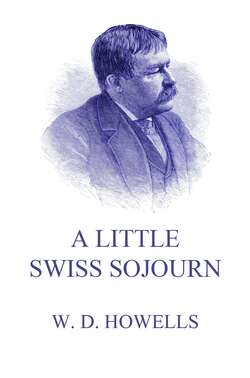Читать книгу A Little Swiss Sojourn - William Dean Howells - Страница 8
V
ОглавлениеAt first we were the only people in the house besides these Swiss ladies and their son and brother, but later there came two ladies from Strasburg, and with them our circle was complete at the table and around the evening lamp in the drawing-room. I am bound to say for the circle, outside of ourselves, that it was a cultivated and even intellectual company, with traits that provoked unusual sympathy and interest. But those friendly people are quite their own property, and I have no intention of compelling them to an involuntary celebrity in these pages, much as I should like to impart their quality to my narrative. In the Strasbourgeoises we encountered again that pathos of an insulted and down-trodden nationality which had cast its melancholy over our Venice of Austrian days. German by name and by origin, these ladies were intensely French in everything else. They felt themselves doomed to exile in their own country, they abhorred their Prussian masters, and they had no name for Bismarck that was bad enough. Our Swiss, indeed, hated him almost as bitterly. Their sympathies had been wholly with the French, and they could not repress a half-conscious dread of his principle of race nationality, which would be fatal to Switzerland, one neither in race nor religion, but hitherto indivisible in her ancient freedom. While he lives this fear can never die in Swiss hearts, for they know that if he will, he can, in a Europe where he is the only real power.
Mademoiselle sat at the chief place of the table, and led the talk, imparting to it a flavor of humorous good sense very characteristic. The villa had been her father's country-house, and it abounded in a scholar's accumulations of old books in divers languages. She herself knew literature widely in the better way that it was once read. The memories of many years spent in Florence made common Italian ground for us, and she spoke English perfectly.
As I wish to give a complete notion of our household, so far as it may be honestly set down, I will add that the domestics were three. Two of them, the cook and the housemaid, were German Swiss, of middle class, who had taken service to earn what money they could, but mainly to learn French, after the custom of their country, where the young people of a French or Italian canton would in like manner resort to a German province. The third was Louis, a native, who spoke his own patois, and found it sufficient for the expression of his ideas. He was chiefly employed about the grounds; in-doors his use was mostly to mount the peculiar clogs used for the purpose, and rub the waxed floors till they shone. These floors were very handsome, of hard woods prettily inlaid; and Louis produced an effect upon them that it seemed a pity to mar with muddy shoes.
I do not speak of Alexis, the farmer, who appeared in domestic exigencies; but my picture would be incomplete without the portrait of Poppi. Poppi was the large house-dog, who in early life had intended to call himself Puppy, but he naturally pronounced it with a French accent. He was now far from young, but he was still Poppi. I believe he was the more strictly domestic in his habits because an infirmity of temper had betrayed him into an attack upon a neighbor, or a neighbor's dog, and it was no longer safe for him to live much out-of-doors. The confinement had softened his temper, but it had rendered him effeminate and self-indulgent. He had, in fact, been spoiled by the boarders, and he now expected to be present at meals, and to be fed with choice morsels from their plates. As the cold weather came on he developed rheumatism, and demanded our sympathy as well as our hospitality. If Elise in waiting on table brushed him with her skirts, he set up a lamentable cry, and rushed up to the nearest guest, and put his chin on the table for his greater convenience in being comforted. At a dance which we had one evening Poppi insisted upon being present, and in his efforts to keep out of the way and in the apprehensions he suffered he abandoned himself to moans and howls that sometimes drowned the piano.
Yet Poppi was an amiable invalid, and he was on terms of perfect friendship with the cats, of which there were three generations—Boulette, Boulette's mother, and Boulette's grandmother. They were not readily distinguishable from one another, and I really forget which it was that used to mount to the dining-room window without, and paw the glass till we let her in; but we all felt that it was a great accomplishment, and reflected credit upon us.
